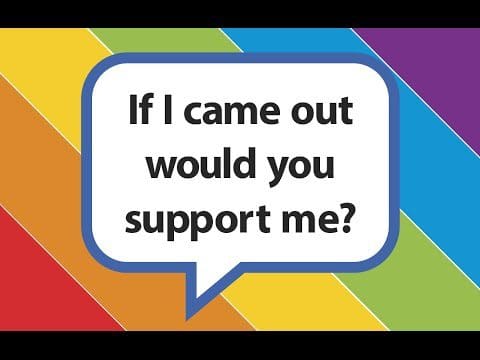Coming Out as a Positive Experience
 “Coming out” is a decision to tell someone a fact about yourself that they may not know—usually something extremely personal and potentially something with a social stigma to it—so it can be hard to remain positive through the process.
“Coming out” is a decision to tell someone a fact about yourself that they may not know—usually something extremely personal and potentially something with a social stigma to it—so it can be hard to remain positive through the process.
Most people know of the phrase “coming out” in relation to sexual orientation or gender identity—like “coming out of the closet”—but it has also been used to refer to times we reveal secret behaviors, beliefs, affiliations, tastes, identities, and interests. Examples could be “coming out as an atheist” to a religious family member, “coming out as disabled” to one’s community, and so on.
In my life, I have come out to several people for a few different things: I’ve come out as being gay, and I have come out with my mental health conditions, Obsessive Compulsive Disorder and Major Depressive Disorder. I have gotten a mix of positive and negative responses in coming out to family and friends. Interestingly, the people responded positively changed depending on what part of myself I was revealing.
When I came out as gay, I found that my family was initially unsupportive, but my friends were overwhelmingly positive. When I came out with mental illnesses, it was actually the opposite: my family was very accepting and helpful, while some of my friends had a surprisingly (to me) negative response.
My communities had different responses, but I noticed some similarities: those who had responded positively felt like they “knew” that quality about me already—or at least had some types of hints—from the ways I behaved when I was around them. Those who responded negatively seemed shocked and felt that I was a different person than the one they knew, or that I was being influenced by doctors or other gay people.
This isn’t to say that it was my fault that people reacted good or bad! The ways other people respond are never something you can control! We just tend to act differently around different people—I can joke with my friends in ways I wouldn’t with my parents, for example, and I have experiences with my siblings that I don’t with my best friend.
This taught me that coming out with any information in a positive way may require different approaches with different groups of people. People tend not to react well when their world view is being challenged, but I think it also happens when the view of people that we feel we know well is also challenged.
People’s responses to coming out are affected by many factors, including religious beliefs and people’s knowledge—or lack of knowledge—about mental health. There is no one-size-fits-all way to come out. But if you think someone may not understand or have difficulty understanding this “new” aspect about you, it may be a good idea to give them a way to process it in their own time. (I found that with time, most of my communities eventually came to have positive responses).
Here is a recent post by a SOVA blogger on how to educate your parents about your depression. I think regardless of what you may be coming out as, these strategies could be helpful!
Have you had any experiences in coming out as something? How did you make the experience as positive as you could? Did you find that you had to use different approaches with different people? Feel free to share your experiences below!




Recent Comments